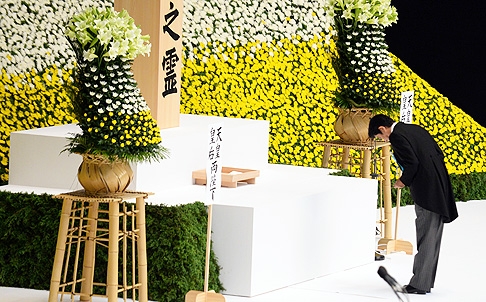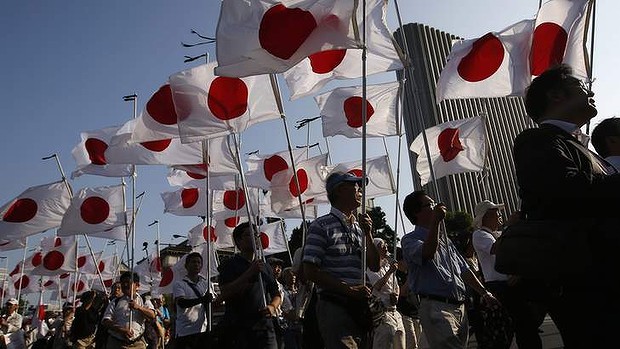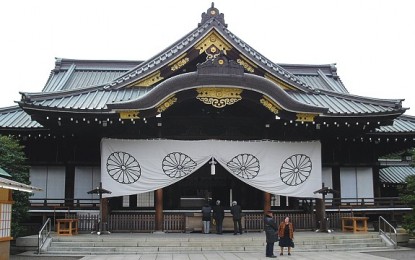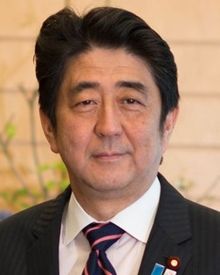An article in yesterday’s Japan News speculates that prime minister Abe is unlikely to visit Yasukuni Shrine this autumn for fear of the political repercussions. The piece originated in the conservative-orientated Yomiuri Shimbun and is interesting for highlighting a number of issues connected with Yasukuni.
One point that is not widely known is that the summer anniversary of the end of WW2 is not the only time that public visits to Yasukuni take place – there are occasions in the spring and autumn that are of significance too.
Another point emphasised in the article is the degree to which the shrine has become a political issue, as opposed to the purely spiritual issue that those on the right maintain it is. A third point is the role of the US in clearly wanting to defuse the Yasukuni issue, and in this respect it’s worth noting the recent visit of Secretary of State John Kerry to Chidorigafuchi, promoting it as a neutral alternative to the Yasukuni Shrine whose war-glorifying museum and enshrinement of Class A war criminals make it, in the words of scholar John Breen, ‘symbolic space’.
************************************************************

As prime minister, Shinzo Abe is nervous about making a repeat (private?) visit to Yasukuni. Photo: Xinhua
Abe may skip Yasukuni visit to aid diplomacy
October 11, 2013 The Yomiuri Shimbun
Prime Minister Shinzo Abe is increasingly inclined to forgo visiting and worshiping at Yasukuni Shrine during an upcoming annual autumn festival to be held there, government sources said.
Abe’s tentative decision apparently reflects his desire to pave the way for improving relations with China and South Korea, as well as to address U.S. concerns about tensions between Tokyo and Beijing. The U.S. administration fears the current situation could be further exacerbated if Abe visits the shrine, according to the sources.
What remains unchanged is Abe’s admitted desire to worship at Yasukuni Shrine, which enshrines the nation’s war dead, including World War II leaders convicted as class-A war criminals at the International Military Tribunal for the Far East, known as the Tokyo Trials.
However, the prime minister may not want to rock the boat as circumstances have become increasingly conducive to the possibility of holding official talks with top Chinese and South Korean leaders.
Yasukuni Shrine’s four-day autumn festival will begin Thursday. Instead of visiting the shrine, Abe is considering having someone take masakaki-ryo, a cash offering, for him to its altar using money out of his own pocket, according to the sources.
Abe’s planned move will be comparable to his action taken at the shrine’s annual spring festival in April.
“Even making a cash offering may prompt China and South Korea to complain, but [what Abe chooses to do at the autumn festival] will never be less than what he did at the spring festival,” a close aide to Abe said.
Abe believes visiting Yasukuni Shrine at its annual spring and autumn festivals is more important than going to the facility on Aug. 15, the anniversary of the end of World War II. Over the years, the war dead, including those who died in World War II, have been commemorated at the facility during such events as figures who sacrificed themselves for their country.
In fact, the prime minister has told his aides and others close to him that “the spring and autumn festivals are the best occasions to visit the shrine as the top leader of the country.” However, Abe will likely give up worshiping there during the upcoming festival, hoping to forgo translating his political beliefs into action. The decision is apparently aimed at not antagonizing China and South Korea further at a time when bilateral relations are seriously strained.
Most visits to the shrine by successive prime ministers have taken place on three major occasions—the spring festival in April, the war-end anniversary on Aug. 15 and the autumn festival in October.
If Abe does not visit during the upcoming autumn festival, according to many observers, he is unlikely to make a single trip to the shrine this year.
The Japan-U.S. relationship has been a significant factor behind the prime minister’s decision on whether to visit the shrine. The U.S. administration has conveyed its concerns to the Japanese government through several unofficial channels.
As circumstances currently stand, the United States must focus its diplomatic resources on dealing with such pressing issues as Syria and Egypt. Given this, Washington does not want to see Japan-China relations deteriorate over a Yasukuni visit by Abe, as it will inevitably affect U.S. foreign policy.
Abe’s second Cabinet was inaugurated in late December. Postponed summit meetings with China and South Korea have been partly attributed to his possible decision to visit the shrine at its upcoming autumn festival.
Abe believes it is possible to use his decision on whether to visit Yasukuni as a diplomatic bargaining chip. If he decides not to visit, Abe hopes, it may significantly improve relations with China and South Korea.

One of the extreme nationalist groups – Gambare Nippon – that celebrate the war dead at Yasukuni (photo Reuters)
“[The government] has taken a step-by-step approach in dealing with China and South Korea, and this process is being expedited, creating an environment conducive to summit meetings [with these countries],” a government source said.
Abe shook hands with Chinese President Xi Jinping at the venue for a recent Asia-Pacific Economic Cooperation forum meeting in Indonesia. Conversation between the prime minister and South Korean President Park Geun Hye took place during a dinner at the venue for the APEC summit meeting, which closed Tuesday. “I often enjoy Korean cuisine,” Abe told the president, a move that apparently served to close the distance between them.
It should be noted, however, that the forthcoming Yasukuni autumn festival will not be the final opportunity for Abe to worship there, as he seems to be increasingly confident that his administration will be able to continue for an extended period. “There are many more chances left [for Abe to visit the shrine],” a close aide to the prime minister said.
One of Abe’s advisers regards the prime minister’s decision on whether to visit the shrine as a tool in dealing with China. “Once a Japan-China summit meeting takes place, it will enable the prime minister to use the Yasukuni visit issue as a diplomatic bargaining chip. All he has to do is to hint at visiting and worshiping at the shrine,” he said.

Yasukuni – a Meiji-era invented tradition to honour the souls of those who died for the emperor in an emperor-centred state


Leave a Reply